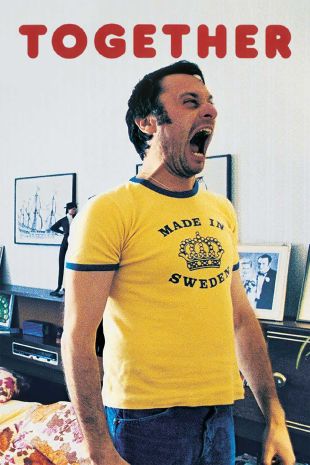
Lukas Moodysson's Together opens in 1975, with a radio announcement that Generalissimo Francisco Franco is dead. At the Tillsammans (Together) commune, an impromptu celebration erupts, which includes two small children jumping up and down excitedly, shouting, "Franco is dead! Franco is dead!" Thus, Moodysson cunningly opens his film by showing us the infectious energy and idealism of the commune members, and gently mocking them for their knee-jerk response. Moodysson, director of the similarly complex, funny, and thoughtful Fucking Åmål (released in the U.S. as Show Me Love), maintains this affectionately mocking tone throughout the film. Though the subject matter and behavior depicted is often crude, Together is a subtle film full of small gestures that convey a range of powerful emotions, and half-spoken thoughts that reverberate into decisive action. Much of what the characters say and do is worthy of ridicule, but Moodysson's film is richly observant and he never loses sight of their essential humanity. Rolf, the estranged husband, well played by Michael Nyqvist, is a prime example. First seen as Elisabeth (Lisa Lindgren) angrily leaves him to join Tillsammans, he seems to be little more than an abusive drunken clod. As his efforts to get Elisabeth back and maintain his relationship with his two children continually backfire, he sinks into an even more pathetic state. But in the end, his utter desolation and his unremitting determination to make amends and regain his family's love endear him to the audience. He's still a mess, but his basic humanity can be appreciated. Moodysson perfectly and truthfully captures the milieu of this commune in 1975, but his greatest strength as a filmmaker is that, like the legendary Jean Renoir, he recognizes that "everyone has his motives."
